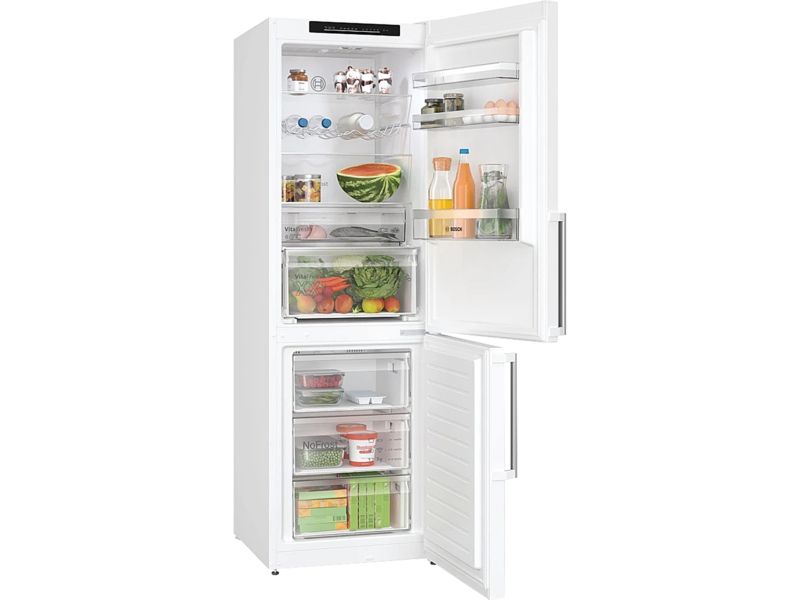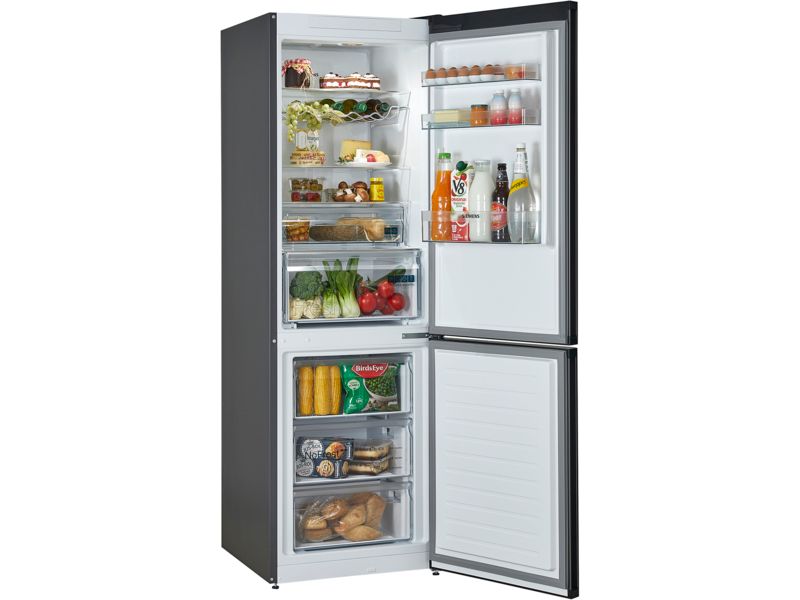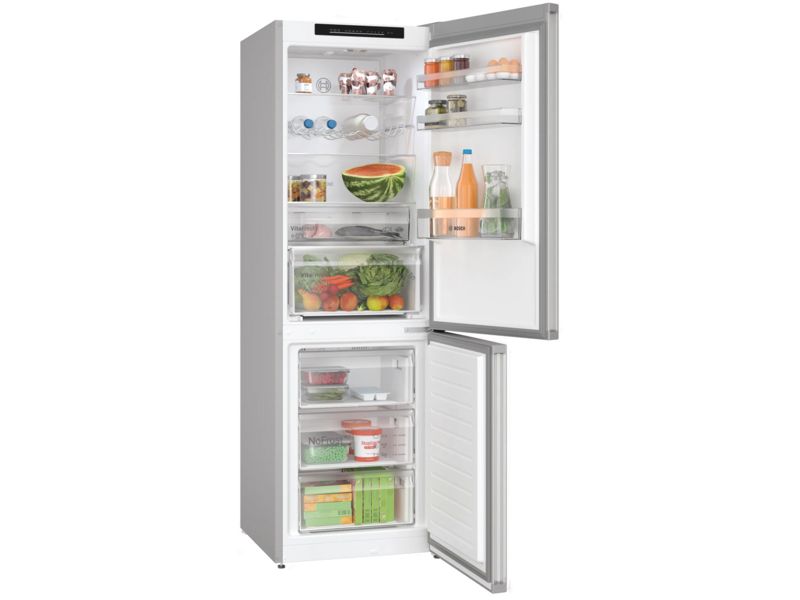How we test fridge freezers

We test more than 125 fridge freezers in our specialist lab each year, but what do we actually do to them, and why are our tests the most rigorous around?
Unlike free-to-access websites, which often get the fridge freezers they review free of charge from manufacturers, we buy all the appliances we test ourselves – so you can have complete trust in our verdict.
The Which? overall percentage score is calculated purely on the measurements and ratings supplied by multiple lab testers, meaning there's no room for bias.
Head to our round-up of the best fridge freezers to help you decide what type of fridge freezer you need.
What are Best Buy, Great Value, Eco Buy and Don’t Buy fridge freezers?

Here's a guide to the recommendations you'll see on our fridge freezer reviews.
Best Buy fridge freezers
These are the models that impress the most in our tests.
A fridge freezer must score at least 74% to earn our Best Buy recommendation.
Best Buy fridge freezers typically do well in most, if not all, of our tests. This means they're likely to chill and freeze quickly and efficiently, have an accurate and reliable thermostat, maintain a safe and stable temperature whatever the temperature in your kitchen, as well as being easy to live with.
Whatever model you're considering, it's still worth reading our reviews to check for any factors that might affect your buying decision.
Great Value fridge freezers
If you want to keep costs down without compromising on quality, go for a Great Value model.
Great Value fridge freezers are at least 20% cheaper than the average price of the models we've tested (based on type) and, most importantly, they do pretty well in our tests, scoring 65% or more.
They must also be rated three stars or more in our chilling and freezing tests. And, because a fridge freezer is plugged in 24/7, they must get at least four stars for energy efficiency.
Some Great Value fridge freezers also score highly enough to be Best Buys.
Eco Buy fridge freezers
If you want to make the most sustainable choice when buying a fridge freezer, an Eco Buy is for you.
Eco Buy fridge freezers will have a lower impact on the environment over their lifetimes compared with others we've tested.
We calculate this in two ways: how energy efficient the fridge freezer is, and how reliable and therefore long-lasting it's likely to be, so you don't have to repair or replace it as often.
To become an Eco Buy, a fridge freezer must:
- get a total test score of at least 70%
- be rated the full five stars for energy efficiency
- earn at least four stars for chilling and freezing power
- not come from a brand that gets a poor longevity rating in our annual consumer surveys.
Only 5-10% of fridge freezers are sustainable enough to be Eco Buys. To find out which qualify, head to our fridge freezer reviews and use the Eco Buy filter.
Don't Buy fridge freezers
Fridge freezers that score 45% or less are Don’t Buys and should be avoided.
Don’t Buy fridge freezers are beset with flaws, so don't expect them to take good care of your food. We've also found some Don't Buys to be potentially unsafe. You should steer well clear.
To find out which fridge freezers did well in our tests, head to our fridge freezer reviews.
How is the Which? score calculated?

The Which? overall score is a percentage. This score only takes into account the results of our tests and ignores price completely.
This means that all fridge freezers are tested on exactly the same scale, so you can compare any model at any price and know how it measures up against its rivals in key areas. All fridge freezers are tested in the same way, regardless of the manufacturers’ claims.
Weightings and star ratings
A Which? test score is made up of dozens of individual tests and checks, from key factors such as chilling and freezing speed to energy efficiency, quietness and ease of use.
To keep things simple, the most important scores are shown as star ratings out of five on each fridge freezer’s Test Results page as an easy-to-compare list of strengths and weaknesses, so you can quickly work out whether a model is right for you.
The most important test results have a greater impact on a fridge freezer’s overall score:
- 35% – chilling and freezing power (20% chilling, 15% freezing)
- 20% – energy efficiency
- 10% – convenience, including ease of use, ease of cleaning and noise
- 10% – accuracy of recommended thermostat setting
- 10% – performance at the optimum setting (we'll explain later how this differs from the test above)
- 5% – ability to keep contents chilled and frozen in a hot room
- 5% – ability to keep contents frozen in the event of a power cut
- 5% – effectiveness of the vegetable compartment
We also measure useable storage space, although this doesn't count towards the test score.
Our testing criteria

Below are our key fridge freezer testing categories and how we evaluate each one:
Chilling and freezing power
Key question: How quickly and how well will the fridge freezer chill and freeze fresh food that I'm putting inside it?
The faster your groceries cool, the longer they’ll last, the more nutrients they’ll retain and the fresher frozen food will be when you defrost it.
Our tough tests are designed to reveal how well a fridge freezer will work in your kitchen. That way, you know that the best fridge freezers will create the best storage conditions for your fresh and frozen food, and help to keep it fresher for longer.
To do this, we set the room temperature to 23°C and part-fill the compartments with gel packs to simulate food already stored inside. Once these have cooled, we add more gel packs – roughly equivalent in size to what you’d buy during a top-up shop for fresh food – and record the time taken for these packs to cool.
The best fridge freezers chill and freeze in a matter of hours, whereas the worst struggle to complete our tests during two whole days of testing.
Chilling power makes up 20% of the total fridge freezer score, while freezing power accounts for 15%.Energy efficiency
Key question: How much will the fridge freezer add to my energy bills and how does that compare to other models?
Don't switch off your fridge freezer to save electricity. You risk getting food poisoning and incurring even higher bills as your appliance uses more energy trying to get its temperature back down. That's why it's essential to buy one that's energy efficient for its size.
We updated our energy testing in 2023 to make it even more stringent, in view of the cost of living and climate crisis. This means that the results of models published before and after September 2023 aren't 100% comparable. However, older models' scores still give a good indication of how they'll perform in your kitchen.
Several tests go into our new energy measurements, including how much energy each fridge freezer uses to:
- chill fresh food
- freeze fresh food
- keep food cool, measured over a 24-hour period – during this time we open and close the fridge door a number of times to replicate how you'd use your fridge freezer in real life.
We then calculate what this is likely to add to your energy bill. To see whether a fridge freezer is cheap to run for its size, we also rate its energy use against the amount of useable storage space it offers – you can see the results on the technical specification tab for each fridge freezer review.
Energy use accounts for 20% of the overall fridge freezer score.Convenience
Ease of use and cleaning
Key question: How easy is the fridge freezer to use on a daily basis and will it be difficult to clean out?
Some fridge freezers are easier to use than others, and a seemingly minor flaw will soon become a major drawback after you’ve experienced it on a daily basis. So we rate ease of use, looking at aspects such as how sturdy the shelves and drawers are, how smoothly the drawers slide in and out, and whether you can fit a 2-litre bottle of water in the door rack.
We also spray cherry juice inside each fridge, let it dry to a sticky mess and then rate how easy it is to clean. This helps us to see how likely food and drink spills are to seep into hard-to-reach spots and crevices. The best fridges are easy to keep clean, while the worst have dirt traps that can harbour food spills and bacteria.
Quietness
Key question: How noisy will the fridge freezer be in my kitchen?
This one is particularly important for anyone working or studying from home in a kitchen, or living in a studio flat.
Every fridge freezer we test is assessed for noise in specially designed sound chambers within our lab. Because it's possible for a fridge freezer to be quiet most of the time, and then make irritating clunking sounds when the compressor switches on, we assess sound quality over a prolonged period of time, rather than just taking a one-off decibel measurement.
Convenience contributes 10% to the total test score.Accuracy of thermostat
Key question: Can you trust the fridge freezer thermostat?
Your fridge freezer manual will tell you what setting to use. But unless you check with a thermometer, you've no way of knowing how accurate this is.
One of the things we test is whether setting the fridge freezer to the manufacturer's recommended setting actually brings it down to the desired temperature.
We check this by following the manufacturer's instructions to set the thermostat and then recording the temperature of gel packs in both the fridge and the freezer compartments.
The best fridge freezers get the temperature spot on, but the worst are way off. This means that by diligently following the manufacturer's instructions and trying to set your appliance to the recommended setting, you could end up storing your food at a warmer temperature than you think. Your food could go off more quickly and potentially be unsafe.
The accuracy of the recommended thermostat setting accounts for 10% of the total test score.Performance on the optimum setting
Key question: How well does a fridge freezer perform when it's set to the ideal setting?
As we mentioned above, not all fridge freezers reach the temperatures claimed by their thermostat. Therefore, we set the fridge freezer to the optimum or ideal setting: in other words, we make sure it's set to actually be at 4°C. If we can't set the fridge to be 4°C exactly because of the dials or other controls available on the panel, we set it as near to this as we can get it, opting for slightly lower if needed rather than higher. Then we test its ability to cool and freeze food under those conditions. If there's a separate freezer thermostat, we set this to -18°C.
Performance on the optimum setting accounts for 10% of the total test score.Ability to keep contents chilled and frozen in a hot room
Key question: Will the fridge freezer keep my food safely chilled and frozen in a hot environment when the temperature rises?
It’s crucial that a fridge freezer keeps your food safely chilled and frozen around the clock, even when your kitchen heats up and cools down. This is because an evenly cool environment is essential to prevent harmful bacteria from growing, and to stop food from spoiling faster than necessary.
So we raise the temperature in our test chamber to 35°C, replicating a heat wave, to see whether the gel packs inside remain safely chilled.
Temperature stability in warm rooms makes up for 5% of the score for a fridge freezer.Ability to keep contents frozen in a power cut
Key question: Will the fridge freezer keep my food safely frozen in a power cut?
To see how a fridge freezer would cope in a power cut, we measure how long it takes for the temperature of our test loads in the frozen food storage compartment to reach -9°C and -7°C, from a starting point of -17°C, in a 23°C room.
However, even models that can cope well in this situation shouldn't be expected to do so for a long period, so don't be tempted to turn off your fridge freezer in the hope of saving money.
Temperature stability in a power cut makes up 5% of the score for a fridge freezer.Effectiveness of the vegetable compartment
Key question: Will my fridge freezer vegetable drawer keep my salad and vegetables crisp and fresh?
We test whether the drawer dries your vegetables. If the drawer has a slider for controlling humidity, we check its effectiveness. We also check the temperature of the drawer, which should be between 0 and 4°C.
If it goes above 4°C, the food within will spoil quicker, so we mark it down.
If the temperature goes below 0°C – at which point your vegetables would turn icy and be ruined – we also mark it down.
Because some vegetables prefer drier or more/less humid conditions than others, this test only assesses suitability for fruit and vegetables that like cold, humid conditions. Examples include asparagus, blueberries, broccoli, cabbage, carrots, celery, cherries, peas and strawberries.
Effectiveness of the vegetable drawer contributes 5% to the score for a fridge freezer.
Fridge freezer storage space
Key question: How much food will I be able to store in the fridge freezer?
Don’t rely on claimed capacities to tell whether one fridge freezer is bigger than another, as manufacturers typically measure volume with all the shelves, drawers and door racks taken out. This could make you think you have more storage space than you really do.
When we measure storage capacity, we leave everything in place and tell you the amount of space you can actually use for storing groceries. Check the technical specification tab of each fridge freezer review to compare realistic sizes.
Some fridge freezers have a lot less storage space for your groceries than others – even those that appear to be the same size.
Fridge freezer capacity doesn’t contribute to our test scores, because it would favour very large American-style fridge freezers, which aren't what everyone's looking for. However, we will tell you how many shopping bags of groceries you'll be able to fit into each appliance.Pick the perfect fridge freezer with Which? reviews
We constantly improve our fridge freezer tests to ensure only the very best models are Best Buys. This means that newer models have been tested and rated in a slightly different way from older models, but you can still use the overall test scores to compare one fridge with another.
You can see when each fridge was tested under the specifications tab in each review.
See all our fridge freezer reviews.



